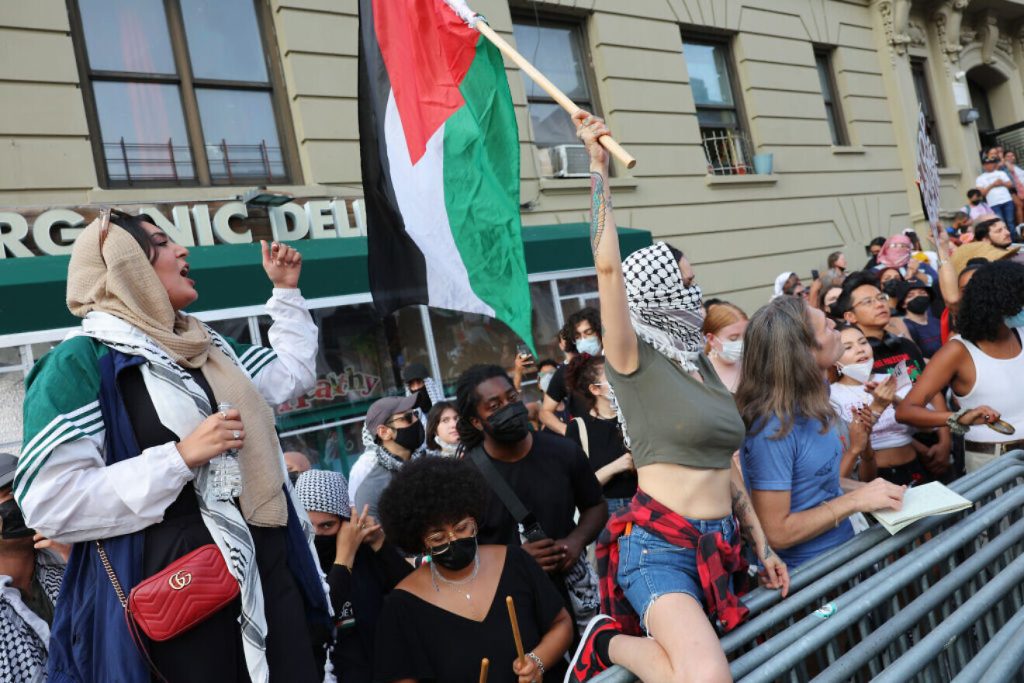
As the Democratic National Convention unfolds this week, pro-Palestinian activists are preparing for a major demonstration outside, protesting against Israel’s ongoing military actions in Gaza. Inside the convention, however, the atmosphere is more complex. Activists are pressuring the Democratic Party and Vice President Kamala Harris to take a stronger stance against Israeli Prime Minister Benjamin Netanyahu’s government.
The Uncommitted National Movement, a group that emerged during the Democratic primaries to challenge President Biden’s handling of the Gaza conflict, is pushing for significant changes. They are demanding a prime-time speaking slot for Dr. Tanya Haj-Hassan, a pediatrician who has recently worked in Gaza and can provide firsthand accounts of the devastation there. Additionally, they are calling for a series of policy shifts, including an arms embargo against Israel.
The Democratic National Convention has seen a mix of enthusiasm for Harris’ candidacy and dissatisfaction among pro-Palestinian groups with the Biden administration’s continued support for Israeli military actions. This discontent contrasts with the increased optimism among Democrats who are rallying behind Harris as she becomes the party’s leading candidate.
Protests in response to Israel’s military actions following Hamas’ attacks on October 7 have spurred widespread demonstrations across the U.S., some of which have been criticized for containing antisemitic sentiments and explicit support for Hamas. These aspects have been condemned by both President Biden and Vice President Harris.
 Harris’ rise as the party’s standard-bearer has shifted the dynamics of activism. Although protests have briefly disrupted her speeches, and campus demonstrations are anticipated to resume soon, many activists are now focusing on quieter lobbying efforts. Harris had a brief meeting with Uncommitted co-founders Layla Elabed and Abbas Alawieh on August 7. While the meeting indicated a degree of openness from Harris, it did not result in a commitment to the activists’ demand for an arms embargo. Harris’s national security adviser, Phil Gordon, later dismissed the embargo proposal but affirmed Harris’s commitment to protecting civilians and upholding international humanitarian law.
Harris’ rise as the party’s standard-bearer has shifted the dynamics of activism. Although protests have briefly disrupted her speeches, and campus demonstrations are anticipated to resume soon, many activists are now focusing on quieter lobbying efforts. Harris had a brief meeting with Uncommitted co-founders Layla Elabed and Abbas Alawieh on August 7. While the meeting indicated a degree of openness from Harris, it did not result in a commitment to the activists’ demand for an arms embargo. Harris’s national security adviser, Phil Gordon, later dismissed the embargo proposal but affirmed Harris’s commitment to protecting civilians and upholding international humanitarian law.
Despite this, Elabed expressed cautious optimism after the meeting. She acknowledged that while Harris did not agree to the arms embargo outright, she agreed to discuss it and consider policies aimed at saving lives. This subtle shift in tone from Harris has provided some hope for the activists, though substantial policy changes remain elusive.
The Uncommitted National Movement has presented several requests to the Democratic National Committee (DNC), including a call for a commitment not to send unrestricted weapons to Israel and for floor credentials for their staff. However, there is little indication that these demands will be met. The DNC has yet to engage meaningfully with the requests, and as of now, there are no Palestinian-American speakers scheduled to address the convention.
A source close to the DNC acknowledged that there is uncertainty about how to address these requests, with some considering them unworkable given the current circumstances. Despite this, there is a sense of mutual respect between the parties involved.
The convention’s atmosphere reflects a broader struggle for pro-Palestinian activists who seek a more assertive stance from the Democratic Party. June Rose, an uncommitted delegate from Rhode Island, has committed to advocating for Harris to support a permanent ceasefire and an arms embargo. Similarly, Abed Ayoub of the American-Arab Anti-Discrimination Committee believes that including pro-Palestinian voices would be both a meaningful gesture and a politically sensible move.
In addition to working with progressive groups, the Harris campaign is engaging with leaders from the Arab American and Jewish communities in Michigan, recognizing the importance of these voting blocs. Campaign officials have held meetings with Arab American leaders to discuss concerns about the administration’s policies in the Middle East.
Osama Siblani, publisher of the Arab American News, met with campaign officials and expressed strong dissatisfaction with the current U.S. policy towards Israel, accusing the administration of failing to address what he described as a “genocide” in Gaza. The Harris campaign has also been meeting with Jewish community leaders to balance their outreach efforts.
The shift from Biden to Harris has created new opportunities for activists but also new challenges. Activists are hopeful that Harris, who has shown some signs of empathy, might use her influence to push for meaningful policy changes. However, they remain wary of the administration’s willingness to make substantial adjustments, with many in the pro-Palestinian community seeking more concrete commitments.
The interplay between activism and party politics at the convention highlights the complex landscape in which pro-Palestinian groups are operating. As the election approaches, the stakes are high for both the activists and the Harris campaign, with each side navigating a delicate balance of influence and response.






